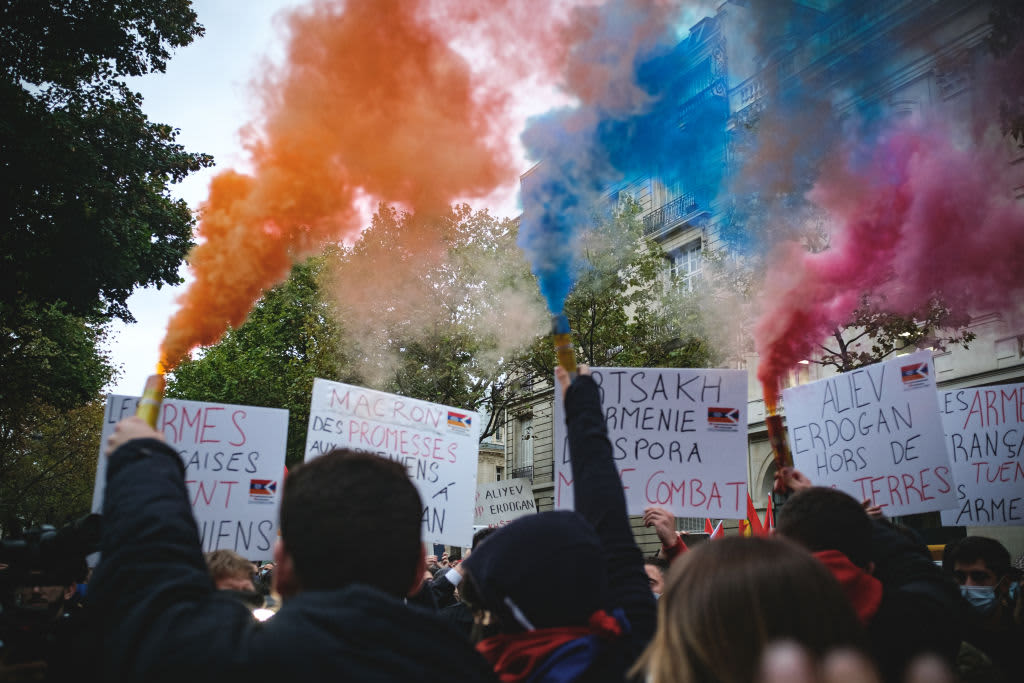
LONDON — The re-emergence of hostilities between Armenia and Azerbaijan over the disputed Nagorno-Karabakh region have ratcheted up fears of a wider regional conflict at the crossroads of Asia and Europe.
Dozens have been reported killed and hundreds wounded since fighting between the two former Soviet republics broke out on Sunday.
The contested mountainous enclave of Nagorno-Karabakh is internationally recognized as part of Azerbaijan, but it has been under de facto Armenian control since the early 1990s. The territory declared independence from Azerbaijan in 1991.
Armenia supports the self-declared Nagorno-Karabakh region, but the country of roughly 3 million people has not officially recognized it.
French President Emmanuel Macron and Russian President Vladimir Putin discussed the fighting via telephone on Wednesday, calling on the warring sides to immediately de-escalate tensions.
United Nations Secretary-General Antonio Guterres has also voiced his "extreme concern" over the latest skirmishes, pushing for a "return to meaningful negotiations without delay."
Leaders of Armenia and Azerbaijan have dismissed the suggestion of holding peace talks, accusing each other of obstructing negotiations.
It is unclear what flared the so-called "frozen conflict" but the fighting has already been the worst in decades.
Regional security implications
Armenia and Azerbaijan fought a six-year war over Nagorno-Karabakh before reaching a truce in 1994 but have both since blamed one another for ceasefire violations in the enclave and along the border, most recently in July.
Located in the South Caucasus between Europe and Asia, majority-Christian Armenia shares a border with Azerbaijan, Georgia, Iran, and Turkey.
Azerbaijan, a mainly Muslim country of almost 10 million people, is to the east of neighboring Armenia and borders Iran, Turkey, Georgia, Russia, and the Caspian Sea.
Russia, a close ally of Azerbaijan, is part of a military alliance with Armenia. The Kremlin has offered to host talks between the two sides, claiming it had contacted the foreign ministers of both Armenia and Azerbaijan on Wednesday.
The fighting has exacerbated tensions between NATO allies France and Turkey. France is home to many people of Armenian ancestry, while Turkey has called on the "entire world" to stand with Azerbaijan.
Many link Turkey's support of Azerbaijan to the mass killing of 1.5 million Armenians by Ottoman Turks in 1915, which Armenia says amounted to genocide. Turkey has resisted calls to recognize the killings as genocide, saying the death toll has been inflated and those killed were victims of a civil war.
In an interview with state-run news agency Anadolu, Turkish Foreign Minister Mevlut Cavusoglu said on Wednesday that French support for Armenia was akin to Paris backing Armenian occupation in Azerbaijan.
In response, France's Macron said he had taken note of the political statements from Turkey, describing Ankara's comments as "reckless and dangerous."
Speaking at a news conference in Riga, Latvia on Wednesday, Macron said he was "extremely preoccupied by the belligerent messages from Turkey in the past hours, which are removing Azerbaijan's inhibitions in what would be a recapture of the Nagorno-Karabakh. And we will not accept that."
Macron said he would speak with the European Council and President Donald Trump about the fighting on Thursday.
Analysts at political risk consultancy Eurasia Group said their baseline scenario was for extended clashes near the line of conflict, but not full-scale conflict that would draw Russia into the fighting.
"As the scope of the stand-off is particularly great, this scenario is still dangerous and presents chances every day for unintended escalation," they said. "It would involve a limited amount of financial strain on Azerbaijan, who is prepared to finance a short-term operation, and probably greater strain on Armenia's fewer financial resources and in light of its general mobilization."
Eurasia Group analysts predicted the situation "could persist for days or even weeks," suggesting the location of the front, Putin's personal involvement, and the scale of Turkish involvement could be regarded as "signposts" for further developments.
Energy concerns
The Nagorno-Karabakh skirmishes also threaten to spill over and impact regional oil and gas infrastructure.
S&P Global Platts said in a research note that the reported conflict zone lies around 30 to 40 kilometers from the Baku-Tbilisi-Ceyhan crude pipeline, Azerbaijan's main oil artery to world markets, and the South Caucasus gas pipeline, linked to Turkey and wider Europe.
"While our base case remains for normal flows, a sustained conflict would increase the risk that the pipeline is damaged or shut down," S&P Global Platts said.
The IEA estimates Azerbaijan, a major crude oil and natural gas producer, supplies about 5% of Europe's oil and gas needs.
Speaking to CNBC's Hadley Gamble on Wednesday, Armenian President Armen Sarkissian said fears of oil and gas disruption as a result of the fighting had been overblown.
"There's absolutely no threat to energy," Sarkissian said, describing the notion that the skirmishes represent a threat to international oil and gas pipelines as "absolute nonsense."
International benchmark Brent crude futures traded at $39.85 a barrel Friday morning, down 2.6%, while U.S. West Texas Intermediate futures stood at $37.75 a barrel, around 2.5% lower for the session.
"between" - Google News
October 02, 2020 at 03:11PM
https://ift.tt/34bdUX2
The fighting between Armenia and Azerbaijan, explained - CNBC
"between" - Google News
https://ift.tt/2WkNqP8
https://ift.tt/2WkjZfX
Bagikan Berita Ini















0 Response to "The fighting between Armenia and Azerbaijan, explained - CNBC"
Post a Comment